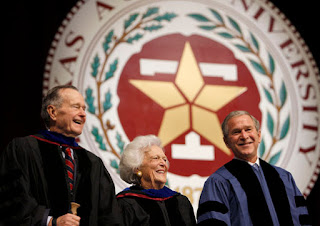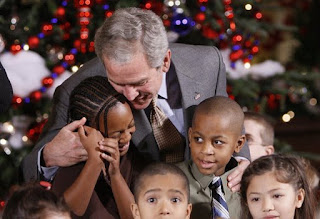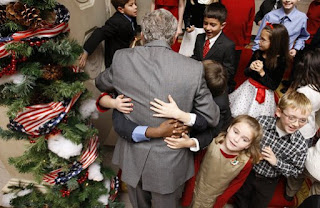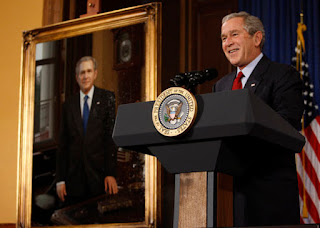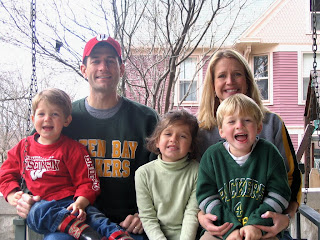Daily Press Briefing Sean McCormack, Spokesman Washington, DC December 11, 2008
MR. MCCORMACK:
Good morning, everybody. Sorry for being a little bit late. I don’t have anything to start with. We’ll get right to your questions. Sure.
QUESTION: Can you explain exactly what was – what this document means?
MR. MCCORMACK: I can’t read it. Sorry.
QUESTION: This would be the Chairman’s statement of the Six-Party Talks.
MR. MCCORMACK: Okay, all right. Sure, let me --
QUESTION: Because it doesn't really --
MR. MCCORMACK: It doesn't address the issue at hand. Right. Let me try to – I’m prepared to try to do that. I’ll let you be the judge as to how precise my explanation is.
Chris is on his way back. And I guess the best way to put this is that, you know, from our point of view, and I think this is a shared point of view certainly among the five parties, North Korea perhaps being the exception, but the objective of this Six-Party round was to formalize the understandings that the U.S. and North Korea had previously reached verification, just to “Six-Party-ize” this so everybody – so everybody could initial it, everybody could put all of these understandings down on paper.
Just to rewind the tape a little bit, in terms – with our – in our negotiations with the North Koreans, we had agreed upon many things on pieces – on a piece of paper that both sides could initial, if you will. Some of the understandings that we reached were part of an oral understanding that we took very precise and careful notes on. In subsequent conversations with other members of the Six-Party Talks, they affirmed that this was their understanding of our conversation with the North Koreans based on their separate interactions with the North Koreans.
So the whole – the idea was to put all of this on a piece of paper so that everybody could understand what was – what had been agreed to in the verification discussions. And part of this – two important points in this were that the reference to scientific – the scientific procedures meant sampling. I know that that is something that there’s been a lot of discussion about. And it also covered not just plutonium, but HEU and proliferation activities. So the scope of the agreement covered all three of those areas, and that one of the agreed upon verification members – one of the agreed upon verification measures was sampling.
So that’s to kind of bring you up to the present date. The draft – and this is an interesting point. The draft that North Korea said it could not sign onto at this round of the Six-Party Talks was a Chinese draft. We had signed onto the draft, so what – North Korea wasn’t – you know, wasn’t rejecting – rejecting is not the right word – didn’t want to sign onto an American draft. This was a Chinese draft. And I think it’s safe to say that all the other members of the Six-Party Talks supported this draft. So in that sense, North Korea, on this question, is isolated.
And where we stand now is that North Korea said it could not, at that meeting, accept the draft, it could not initial the draft. All the parties said okay, let’s – let’s adjourn the meeting, go back to capitals, think about it, and we’ll keep working this process. But this is, I think, an indication – it’s a public indication of how central to this process we view verification. Verification is absolutely essential to this process. Quite frankly, it is not going to be able to move forward without agreement on a verification protocol. So we will – in terms of our obligations, I don’t see those moving forward until we have an agreement on this verification protocol.
QUESTION: So I’m --
MR. MCCORMACK: So is that precise enough?
QUESTION: Well, I mean, maybe. But why do you make such a big deal out of the fact that it was a Chinese draft and not – I mean, basically, didn’t the Chinese – didn’t the Chinese draft incorporate or include all of the things that you had a – that you just got verbal understandings with?
MR. MCCORMACK: Yeah. Yes.
QUESTION: So what difference does it make whether it’s a --
MR. MCCORMACK: Well, because very often – very often, this gets played out in public and the media as a U.S.-North Korea issue. And I make the point only to say that this is not a U.S.-North Korea issue; this is a North Korea-all the rest of the members of the Six-Party Talks issue. And in fact, this was a Chinese draft that --
QUESTION: Is it fair to say, though, then that the – or that the initial understandings that Chris thought he had with the North Koreans was a U.S.-North Korean?
MR. MCCORMACK: On behalf – no, but we were negotiating on behalf of the other parties. It was – these were understandings that we arrived at --
QUESTION: It doesn't appear that it worked very well if you --
MR. MCCORMACK: Well, I think it worked well for five of the six parties, and we’ll see whether or not it works for the last of the six parties. Now --
QUESTION: (Inaudible.)
MR. MCCORMACK: It is, admittedly, but – admittedly. But as I said, this process is not going to move forward beyond this point without a verification protocol being agreed upon.
QUESTION: Sean, did you jump the gun then, taking them off the state sponsors --
MR. MCCORMACK: No, and I knew that this was going to come up.
QUESTION: (Inaudible.)
MR. MCCORMACK: No, it’s – because that was – that was an action, again, as I said yesterday, that was based on the law and the facts. That’s an irreducible condition. You can’t get around that. They met the criteria.
As I said, this is a process that is action-for-action, and the North Koreans had made considerable progress on disablement and they had – and they also agreed with us on a verification protocol. So – and again, I don’t want to go back to tracing – you know, connecting each action for each action going back to the beginning of this process, but fair to say, that’s where we were up until this meeting. And going forward, the United States is – and I think it’s to say perhaps others – not going to move forward with further obligations absent a verification protocol.
QUESTION: Are you going to rethink your policy toward North Korea?
MR. MCCORMACK: No. Again, we’ll see, you know, the – the place where we find ourselves now is that this meeting has been adjourned. It did not achieve the goal of an agreed among the six verification protocol. We have agreement among five. We’ll see on the sixth. They are going to back to their capitals. They are going to think about it, consider the proposition. And we’ll see – we’ll see what that yields.
All of that said, this – you know, this mechanism will still be, in that intervening time – and I can’t tell you how long that intervening time will be – will remain a vital consultative coordination mechanism for the United States as well as the other four parties.
QUESTION: So is the negotiation over for the --
MR. MCCORMACK: No.
QUESTION: -- Bush Administration?
MR. MCCORMACK: No. I – well, in terms of further action in the Six-Party mechanism, we’ll see what the North Korean response is going to be. And I want to emphasize that the idea here is that there will continue to be work, there will continue to be action, in terms of consultation. And certainly, we, as well as others – the Chinese, I would expect – will encourage North Korea to accept the common understanding of the other five and to move this process forward.
QUESTION: Do you think it was a mistake to come to an oral understanding on this issue, you know, bilaterally with the U.S. and North Korea?
MR. MCCORMACK: No, because we got a commitment. And we have very, very precise notes about those commitments, and we committed those to paper and also in the form of a memorandum, a memorandum for the record, if you will. So we know what was committed to during those discussions. And it was very, very useful to be able to bring that written record. And again, others have independently confirmed the substance of those conversations between the United States and North Korea. So it was very useful to have that down on paper. Now, we’ll see if North Korea – we’ll see if North Korea is willing to take the next step and to formalize that among the six.
QUESTION: But it did give North Korea a way out. I mean, if it wasn’t in writing and it was just an oral understanding, it did give them a way to sort of not agree to this.
MR. MCCORMACK: Well, again, the process isn’t moving forward either way. So we have actually advanced the ball where they have this – they have reached an understanding with us based on behalf of the other parties. We will see if they will take that next step now to formalize it on paper among the six.
QUESTION: So your failure to get them to agree in this is actually progress; is that what you’re saying?
MR. MCCORMACK: No, we did get them to agree.
QUESTION: But they haven’t.
MR. MCCORMACK: Again – and again --
QUESTION: When you say that others have independently verified, how is that possible when they --
MR. MCCORMACK: In conversations with the North Koreans. Look, there is nothing easy --
QUESTION: So the North Koreans have made these verbal commitments to other members of the Six Parties?
MR. MCCORMACK: There was an understanding that was affirmed verbally with the Chinese that this was the understanding. And again, this is a Chinese draft of the verification – verification protocols, and we’ll see if this process move forward. And you know, we have been rock solid on the issue of verification, saying this is central to this process and it will not move forward without a verification protocol. And I’ll add, just again editorially, that this is not – in this verification protocol, this is not anything extraordinary. This is common practice in these kinds of agreement.
Now, perhaps it is not common practice with North Korea. We understand that – we understand the parties – the party with whom we are negotiating. We’ll see if they’ll take this next step. If not, then this process, at this point, won’t move forward. It will still remain vital in terms of a mechanism to achieve denuclearization of the Korean Peninsula, and we still believe that we can make progress in the remaining time we have in this Administration. We’ll see, though. That will be up to North Korea.
QUESTION: Okay. There’s no date set for the next meeting at the envoys level --
MR. MCCORMACK: Correct.
QUESTION: -- but there is a date set for this working group on the (inaudible) the Northeast Asia Security Initiative, and that date is set for February in Moscow. Are you confident that the next administration – how can you commit the next administration to this?
MR. MCCORMACK: Well, again, they will make their own decisions. We have always said that we will act in what we believe to be the best interests of the United States in foreign policy. But very clearly, you know, each administration is going to have – the new administration is going to have to make its own decisions about which meetings it attends and doesn't attend based on its policy orientation. I mean, for example, there are NATO meetings scheduled which we say, yes, we’re sure the next administration will be there, but again, I guess technically --
QUESTION: That’s not --
MR. MCCORMACK: You know, technically --
QUESTION: But NATO is not an initiative of --
MR. MCCORMACK: I know. I exaggerate to make a point, Matt. The – you know, everybody knows they’re going to show up. But again, they’re going to have to make their own decisions about --
QUESTION: Well, yeah. But the incoming administration, or at least during the campaign, and its officials were quite unhappy with the way that the Bush Administration dealt with North Korea. Is there – and do you have any indication from them that they’re prepared – that they’re willing to carry on and that they’ll go ahead and --
MR. MCCORMACK: I will let them speak for themselves.
Yeah.
QUESTION: Do you feel sort of double-crossed by the North Koreans? I mean, they promised you one thing early and now they’re not committing themselves? I mean, do you feel as if they’re just dumping you and hoping for the next – a better deal with the next administration?
MR. MCCORMACK: Do we feel jilted?
QUESTION: Do you feel jilted? Yeah.
MR. MCCORMACK: No. Look, we understand with whom we are negotiating. I don’t think that there are any illusions about that. And I don’t think that there has been anything easy about this process, but it has yielded results through difficult and less difficult times. And we’ll see. This is one of those times where we’ll see if the process moves forward. We’ve had – we’ve gone through a number of these different way points, and to date it has moved forward, albeit not at the pace that we or others would have hoped. Nonetheless, it has moved forward. And evidence of that is the state of the disablement of Yongbyon, something that has never before been achieved – not even close – as well as the kinds of declarations that the North Koreans have made. Now, we’ve said we don’t take those on face value, they have to be verified, which brings us to the point where we are right now. And we’ll see if we can get to the point of an agreed upon “Six-Party-ized” verification protocol.
QUESTION: What about those who’ve been very critical of you, like John Bolton, for example? I mean, he feels like you gave them the keys to the candy store and just said, you know, go in and take whatever you like.
MR. MCCORMACK: You know, the First Amendment is alive and well. You know, freedom of speech in this country – and he was entitled to his opinion. We don’t agree with him. We think that’s wrong. We think that we have taken a sober-minded approach to this that is in the best interest of America’s national security and foreign policy. Some will disagree with that, and we’ll see what the process yields. But I – you know, you’ve heard, you know, me, you’ve heard the Secretary, you’ve heard the President of the United States talk about the fact that we believe that this is the right policy. And we have been very careful in implementing the policy. It has been action-for-action. And you see now we have gotten to the point where we need to see action from North Korea; otherwise, the process will not move forward.
QUESTION: But you took them off the list because you had the promise, well, things are moving along, but you also had the promise that they were going to meet their obligations, and they’ve not met them. So are you going to just (inaudible)?
MR. MCCORMACK: And the process --
QUESTION: I know you said earlier that you wouldn't, but could you slap them back on the list?
MR. MCCORMACK: Again, the law dictates how you get on the list; it dictates how you get off the list. If they meet the criteria for getting back on the list, one supposes they could be put back on the list. But I’m not aware that there is any indication that they have met the criteria.
QUESTION: But are you looking at that?
MR. MCCORMACK: You look at it always with every country around the – I guess, supposedly, every country around the world, technically speaking. But I’m not trying to indicate – indicate to you any particular action on our point.
QUESTION: What happens to the oil shipments? Will those be suspended?
MR. MCCORMACK: The what? (Inaudible.) Well, we – the United States – and I – as I said, I suspect others, have obligations, and this is an action-for-action negotiation. We have yet to see action on the verification protocol from North Korea. So I suspect that that would be – anything that we might do would be pending North Korea taking the steps that they have obliged themselves to make.
QUESTION: So they’re suspended for now?
QUESTION: Who’s next?
MR. MCCORMACK: I would suspect – I – you – I don’t think you’re going to see much action from other parties until North Korea acts.
QUESTION: Who is next to deliver fuel to them?
MR. MCCORMACK: I’ll check for you. I don’t know.
QUESTION: Would you recommend that that party not go ahead and deliver fuel?
MR. MCCORMACK: Again, I think the ball is in North Korea’s court in terms of what needs to be done next.
QUESTION: Just one more. They met for four days.
MR. MCCORMACK: Mm-hmm.
QUESTION: The main thing that you – that everyone – or that this meeting – that these meetings were supposed to produce was this verification protocol.
MR. MCCORMACK: Mm-hmm.
QUESTION: And unless I have a bad copy of this statement, the word “verification” appears once.
MR. MCCORMACK: Uh-huh. Are you saying that (inaudible)?
QUESTION: And it’s – and it says – verification comes out as part of the agenda items, and it’s never mentioned again.
MR. MCCORMACK: Are you saying, Matt, that a multilateral diplomatic statement is opaque?
QUESTION: Yeah.
MR. MCCORMACK: Color me shocked. (Laughter.)
QUESTION: This seems --
MR. MCCORMACK: Yeah. Look, I think I’ve given a pretty clear summation.
QUESTION: All right. This is the second time in the -- a couple of months where things that were oral agreements in international affairs have floundered, have fallen apart, the first being the Russia-Georgia ceasefire where everything was allegedly based on the notes that the French took when in their meeting, and now you have this debacle.
MR. MCCORMACK: Debacle?
QUESTION: Yes. Is there any more given – any thought to the idea that maybe, you know, one side’s notes are really not the best way to, you know, approach – to solve problems, that you really need to get things on writing – in writing first?
MR. MCCORMACK: Which is what we were doing in Beijing.
Yeah.
QUESTION: Just one more. You have five weeks, I think -- left till January 20th. Do you expect any (inaudible)?
MR. MCCORMACK: Forty days.
QUESTION: Oh, is it?
MR. MCCORMACK: Forty days.
QUESTION: Okay.
QUESTION: But who’s counting?
MR. MCCORMACK: Right. But who’s counting? (Laughter.)
QUESTION: Looking at the calendar. Do you expect any greater U.S. push with North Korea bilaterally to try to bring them around one more time? Is that worth it?
MR. MCCORMACK: Well, I – I suspect that, you know, all the members of the – albeit the five members – will continue to work with North Korea, consult with North Korea. But the protocol is the protocol, and we would urge them to see it as in their interest to agree to it.
QUESTION: Could you put it in context? Is that a serious breakdown in this long process of talks? I don’t think you agreed with Matt’s description, but how would you characterize the --
QUESTION: (Inaudible.)
QUESTION: You don’t --
MR. MCCORMACK: No, I wouldn’t agree with that characterization. You know, I don’t know. I can’t put a bumper sticker on it. It’s not going to move forward until they agree to the verification protocol.
Anything else on North Korea? All right, let’s --
QUESTION: Okay. So the UN banning the Jamaat ul-Dawa yesterday evening, can you get a reaction to that, one? And two --
MR. MCCORMACK: Is this the 1267 committee?
QUESTION: Yeah.
MR. MCCORMACK: Yeah.
QUESTION: And does the U.S. plan to do something similar for the – do you have (inaudible)?
MR. MCCORMACK: Well, clearly, we support the action of the committee. In terms of the United States, you know, we don’t – we don’t foreshadow any particular move that we might take. You know, our people who have responsibility for looking at ways to ensure that terrorist groups can’t – don’t have access to the kind of funding or resources that they need to operate, that’s an ongoing 24/7 operation. And we make announcements post facto, and the reason for that is you don’t want to have asset flight. That applies to all of those kinds of operations.
Yeah.
QUESTION: The Indian Foreign Minister this – has just recently said that Pakistan is not doing enough, or more needs to be done. Is that also what the U.S. believes?
MR. MCCORMACK: Well, we think that Pakistan has taken some important steps. As I said yesterday, it’s a day-by-day kind of thing. This is – and not just Pakistan; countries around the world where there’s an issue with violent extremists or terrorists. Our emphasis has been, in terms of the steps Pakistan has already taken, let’s make sure that everything is done to prevent any future terrorist attacks. And ultimately, people responsible have to be brought to justice, and again – but we’ll continue to work with both parties on this.
QUESTION: Just about an hour ago, Pakistan said that following the UN ban, it will be banning the Jamaat ul-Dawa. According to U.S. intelligence, is that something you believe will happen? After the parliament attack, it said it would ban the Lashkar e-Tayyiba, and that seemed to have just petered out with time.
MR. MCCORMACK: We’ll – again, we’ll let the Pakistani Government speak to their own actions. But certainly, you know, I believe that – I have seen news reports that they have made that announcement, and certainly, that would be a positive step.
Yeah, Sue.
QUESTION: The Secretary’s been quite outspoken about President Mugabe, and – well, what are you planning next week at the UN in terms of trying to take action against Mugabe and to force him out?
MR. MCCORMACK: Yeah. We’ll put out a media note for you either today or tomorrow just formally announcing – she’ll be up at the UN for a variety of different activities, and we’ll try to describe those in more detail either Friday or Monday for you. I expect Zimbabwe will be a point of discussion. Certainly, she’ll be seeing many of her colleagues on the Security Council as well as many of her counterparts who will be coming to New York as well to address a variety of different issues, whether that’s piracy or whether that’s Zimbabwe.
We have made quite clear where we stand, and we think it is time for all countries who have what I refer to as unused leverage to use that leverage. The time has come for Robert Mugabe to go. His continuance in that position is a hindrance to Zimbabwe being able to get itself – pull itself out of this deep crisis in which it finds itself, which is just sad to watch. And the countries in the region have a special responsibility in that regard. There is a humanitarian crisis that is only deepening, and we’re trying to respond to that. And I think in a couple of minutes, you will – well, once we’re done here, our Ambassador to Zimbabwe, Ambassador McGee, will be out here along with USAID Administrator Fore to give you a little sense for not only the situation on the ground, but how the United States is responding to it.
The last count I had -- and perhaps Administrator Fore has an update for you -- just a couple days ago, we had 14,000 cases of cholera in Zimbabwe with the prediction that that was – that number was going to -- only going to grow.
QUESTION: You say that the countries in the region have a special responsibility.
MR. MCCORMACK: Yeah.
QUESTION: That would be particularly South Africa. So what are you doing --
MR. MCCORMACK: As well as others, as well as others. Namibia --
QUESTION: Yeah, Botswana, Zambia, Namibia. So --
MR. MCCORMACK: Namibia, Angola.
QUESTION: So what – what are you doing specifically to try and get those countries to do something? Is Jendayi Frazer, for example, doing a trip around the region? Is she calling meetings? I mean, what are you (inaudible)?
MR. MCCORMACK: She’s been working --
QUESTION: You can’t keep saying do something and --
MR. MCCORMACK: She – I know – she’s been working the phones. I know that the Brits, as well as others, have been working the phones on this issue. And you know, I can’t rule out the Secretary herself won’t be making some phone calls as well. We’ll try to keep you up to date on that.
QUESTION: Who has she called so far? Has she called a few (inaudible)?
MR. MCCORMACK: Nobody, thus far. We’ll keep you up to date.
Anything else? Yes, sir.
QUESTION: Yeah. On the Somali pirates, any update on a draft resolution that would allow the international forces to go after pirates on the mainland?
MR. MCCORMACK: Nothing for you on that. Again, we’re – you know, we addressed the issue, and I guess the framework issue at sea in passing – the rollover of 1816, which was – authorizes the use of all necessary means at sea. But if you – you have to address that at sea, you also have to address the sort of the root at – try to address some of the root issues on land. And we’re talking to colleagues up in the Security Council about how to do that, what the best way to do that is.
QUESTION: It would be by plane? It will be striking, bombing, or it will be –
MR. MCCORMACK: We’re still working on the politics of this.
QUESTION: (Inaudible.)
MR. MCCORMACK: We’re still working on the politics of this.
Nina, did you have a question? You were --
QUESTION: One quickly about Pakistan. These guys are now under house arrest. Is there any pressure from the U.S. about them being taken out of house arrest, being sent to India? Anything like that going --
MR. MCCORMACK: We haven’t made any – any specific prescriptions. We’ve talked in general terms and in terms of principle about those responsible being held to account and facing justice. The Pakistani Government has demonstrated – it has acted on what we think are good instincts in terms of going after some of these individuals and extremist groups, and we’ll see what the next steps are. Ultimately, they’re going to have – I mean, they’re going to be the decision makers on this, but we can certainly make clear our views as well as others who can make clear their views.
QUESTION: But you’re not concerned that they might linger under indefinite house arrest?
MR. MCCORMACK: Well, right now, just as a matter of principle, our – our concern is that any individuals not be able to be – be able to participate in any planning of violent acts, and that inasmuch as one possibly can, learn information that would help prevent future attacks.
Yeah.
QUESTION: So Pakistan believes that extraditing them to India is not an option. What would you say the other options are, then?
MR. MCCORMACK: Again, I’m not going to offer any particular options. I think I’ve outlined in principle how we see things.
QUESTION: All right. Can I just go back to Somalia for a second?
MR. MCCORMACK: Yeah, sure.
QUESTION: So there is or there is not a draft? You have or you have not written up a draft that calls for fighting the pirates on land?
MR. MCCORMACK: Honestly, Matt, I don’t know what state this effort is in. I’m sure words have been put to paper in trying to get at, you know, how do you get at the problem on land. And this gets wrapped up, as well, as an issue that we have been talking about for quite some time, about an international force that could assume the responsibilities that the Ethiopian forces in Somalia now have taken on in terms of trying to provide some greater security and stability there. So all of these questions at the moment are wrapped up in discussions in New York. I’ll try to find out for you exactly what state those discussions are in, whether or not they’ve reached a state of --
QUESTION: The Secretary General has put forward a suggestion to replace the current force with a multilateral force that is not a blue-helmeted UN force, that they would take over in the interim, that it would then – that would work towards – and work while peace talks were going on between the Islamists and the TFG.
MR. MCCORMACK: Right.
QUESTION: And then, once a ceasefire was signed, that would be replaced by a UN force. Is that --
MR. MCCORMACK: Let me --
QUESTION: -- something the U.S. supports, or are you looking at – are you wanting to move to a UN force sooner than that?
MR. MCCORMACK: Let me – I know that we’ve been working on trying to get an international force deployed urgently, and there have been a number of different options. Let me check for you, Matt, to see what we think about that specific proposal. I confess that I just don’t have the details.
Okay? All right.
QUESTION: Thanks.
(The briefing was concluded at 11:02 a.m.)
DPB#209
Released on December 11, 2008

 y recibir la dirección de radio presidencial semanal en inglés y español con informes selectos del departamento del estado. Ofreciendo transcripciones audio y con texto completo verdaderas, más fuentes contentas agregaron a menudo así que la estancia templó.
y recibir la dirección de radio presidencial semanal en inglés y español con informes selectos del departamento del estado. Ofreciendo transcripciones audio y con texto completo verdaderas, más fuentes contentas agregaron a menudo así que la estancia templó.








